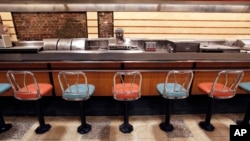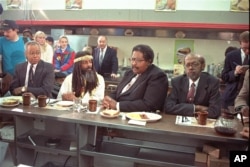GREENSBORO, NORTH CAROLINA —
February is U.S. Black History Month, a time to pay tribute to people and events that helped shape the history of African Americans. A pivotal moment in that history happened 54 years ago when four black university students in North Carolina sat down at a whites-only lunch counter. Their actions re-ignited the U.S. civil rights movement and the struggle by millions of African Americans to achieve racial equality and justice.
In 1960, Joseph McNeil and three other young black university students sat down to get something to eat at a "white's only" lunch counter at the Woolwoth's department store in Greensboro, North Carolina. "In our hearts we thought all racial segregation was an evil," he said.
When they were not served because of their skin color they refused to leave. Jibreel Khazan was another member of the so called "Greensboro Four" who remembers the conversation he had with the white waitress 54 years ago.
"What do you boys want? And we said we would like to be served very politely. And she [the waitress] said you boys know we do not serve colored people here there is a lunch counter for you over there," Khazan recalled.
The sit-in demonstrations grew and each day more students would came to the lunch counter in peaceful protests. The action played a pivotal roll in the civil rights movement by helping to integrate lunch counters nationwide.
McNeil and Khazan, the two surviving members [of the first sit in] returned to the famous lunch counter that is now a civil rights history museum. McNeil said its a place with great symbolism. "It lets us not forget the suffering and sacrifice that made it possible for all of us to be better Americans just a little bit and to treat each other with a little respect, and that is worthwhile," he said. "To the extent that the [civil rights] museum fulfills those types of awareness then it serves a great purpose."
The February 1960 sit-in demonstration injected a new level of activism into the civil rights movement, which until then had largely been confined to fighting for equal rights in the courts. After four months and $200,000 in lost business Woolworth agreed to integrate its lunch counter.
McNeil said their protest movement has become more than just a part of black history. "I am a part of American history and America's influence in history on the rest of the world. Things that are happening today probably had its genesis going back to the 1960's and even before that. So it is good to be a part of that and to be on the right side of justice," he added.
Now the history of the sit in demonstrations lives on with a museum devoted to promoting an understanding of the struggles for equality around the world. Joseph McNeil believes much remains to be done in overcoming racial barriers.
"The fight goes on and there is no turning back. We are going to have to press ahead with as much vigor as we had back in the 1960's as we face challenges on a day to day basis. We are talking about challenges in terms of voting accessibility and challenges in terms of social justice. The engagement still needs to take place and we need to be prepared to stay in this thing [the fight for civil rights] for the long haul," McNeill stated.
McNeil said its those same feelings many civil rights demonstrators experienced more than five decades ago.
In 1960, Joseph McNeil and three other young black university students sat down to get something to eat at a "white's only" lunch counter at the Woolwoth's department store in Greensboro, North Carolina. "In our hearts we thought all racial segregation was an evil," he said.
When they were not served because of their skin color they refused to leave. Jibreel Khazan was another member of the so called "Greensboro Four" who remembers the conversation he had with the white waitress 54 years ago.
"What do you boys want? And we said we would like to be served very politely. And she [the waitress] said you boys know we do not serve colored people here there is a lunch counter for you over there," Khazan recalled.
The sit-in demonstrations grew and each day more students would came to the lunch counter in peaceful protests. The action played a pivotal roll in the civil rights movement by helping to integrate lunch counters nationwide.
McNeil and Khazan, the two surviving members [of the first sit in] returned to the famous lunch counter that is now a civil rights history museum. McNeil said its a place with great symbolism. "It lets us not forget the suffering and sacrifice that made it possible for all of us to be better Americans just a little bit and to treat each other with a little respect, and that is worthwhile," he said. "To the extent that the [civil rights] museum fulfills those types of awareness then it serves a great purpose."
The February 1960 sit-in demonstration injected a new level of activism into the civil rights movement, which until then had largely been confined to fighting for equal rights in the courts. After four months and $200,000 in lost business Woolworth agreed to integrate its lunch counter.
McNeil said their protest movement has become more than just a part of black history. "I am a part of American history and America's influence in history on the rest of the world. Things that are happening today probably had its genesis going back to the 1960's and even before that. So it is good to be a part of that and to be on the right side of justice," he added.
Now the history of the sit in demonstrations lives on with a museum devoted to promoting an understanding of the struggles for equality around the world. Joseph McNeil believes much remains to be done in overcoming racial barriers.
"The fight goes on and there is no turning back. We are going to have to press ahead with as much vigor as we had back in the 1960's as we face challenges on a day to day basis. We are talking about challenges in terms of voting accessibility and challenges in terms of social justice. The engagement still needs to take place and we need to be prepared to stay in this thing [the fight for civil rights] for the long haul," McNeill stated.
McNeil said its those same feelings many civil rights demonstrators experienced more than five decades ago.









